5th Floor, West Tower, World Financial Centre
1 Dong San Huan Middle Road
Chaoyang District, Beijing 100020, China
Tel: +86 10 5081 5880

March 10, 2021
Professor Zhan Jiang Awarded March 8 Red-Banner Pacesetter by SJTU
On March 8th, 2021, Shanghai Jiao Tong University (SJTU) held the Commemoration of the 111th Anniversary of International Women's Day and the Awarding Ceremony of Advanced Individuals at Minhang Campus. Forty female employees, including Professor Jiang Zhan, won the SJTU honorary title of March 8 Red-Banner Pacesetter for 2019-2020. Professor Zhan Jiang joined SAIF in July 2011 and is one of the first full-time professors at SAIF. She has made outstanding contributions to SAIF's development in teaching, research, and management.
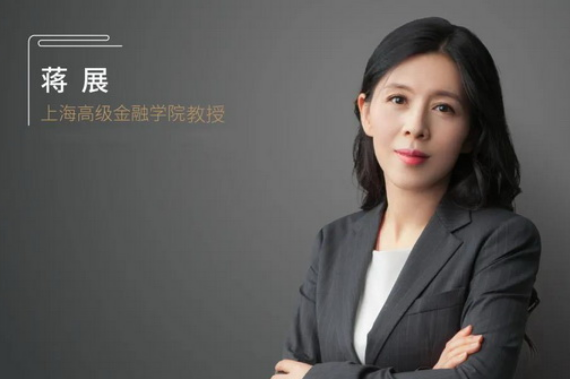
March 01, 2021
Professor Hong Yan Awarded Key 2020 Grant from Shanghai Finance Society
Recently, the Shanghai Finance Society announced the winners of Key Grant Awards in 2020. The project “Research on the Development of Offshore Center at Lingang New Area of Shanghai Free Trade Zone”, led by Professor Hong Yan (Deputy Dean for Faculty and Research, and Professor of Finance at the Shanghai Advanced Institute of Finance), won the 2nd Prize of Key Grant Award in 2020. This demonstrates the strength of SAIF faculty in policy studies and applications, as well as SAIF’s significant role as a think tank in the construction of Shanghai as an International Financial Center. The Shanghai Finance Society solicits grant applications from its members every year in order to expand its functions as a think tank and platform of academic exchange, and to encourage the members to carry out targeted and practical research on finance. In 2020, a total of 56 applications were submitted and 36 grants were awarded, including three grants from SAIF. Based on expert review and the intellectual property status of the grants, the Society selected a total of 18 winners, including five 2nd Prizes (with the 1st Prize vacant), eight 3rd Prizes, and five Excellent Prizes. The research group led by Professor Yan targeted the offshore center planning of the Lingang New Area in Shanghai. In view of the fact that full currency convertibility and capital account opening are unavailable in China at the moment, it is suggested that the offshore financial market should separate its domestic and international operations. However, given the role of China’s offshore market in providing overseas funding to Chinese businesses, it is also important to maintain appropriate exchange channels under the framework of domestic and international separation. In addition to development direction and functional deployment at the macro level, the research group led by Professor Yan also proposed six measures for the specific construction of the offshore RMB center at Lingang New Area: 1) To drive RMB asset pooling and create multi-level asset pooling of RMB-denominated stocks, bonds and derivatives; 2) To improve the offshore financial market policy system; 3) To regulate the offshore financial market management system; 4) To take measures to promote the development of offshore services; 5) To strengthen the construction of financial infrastructure; and, 6) To build a risk management system and linked controls suitable for both onshore and offshore markets.
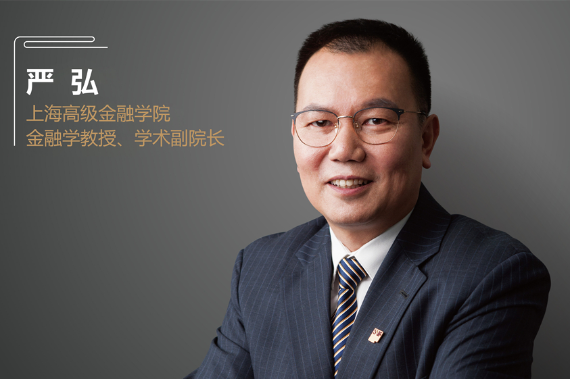
February 26, 2021
Professor Jun Li’s Research Published in The Review of Financial Studies
Recently, The Review of Financial Studies, a world-class journal, published “The Collateralizability Premium”. It was co-authored by Professor Jun Li, Assistant Professor at Shanghai Advanced Institute of Finance (SAIF) at Shanghai Jiao Tong University (SJTU) in collaboration with: Hengjie Ai of the Carlson Business School of University of Minnesota, Kai Li of Hong Kong University of Science and Technology, and Christian Schlag of Frankfurt University. The Review of Financial Studies (RFS) is one of the Top 3 international financial journals in the world, published by Oxford University Press on behalf of The Society for Financial Studies. The paper was inspired by literature review on financial friction. After the financial crisis, there were a large number of papers and models about financial friction in macroeconomic literature, but literature focusing on the impact of financial friction on cross-sectional stock returns was limited, especially on collateral-back lending. Therefore, Professor Li and his collaborators focused upon the friction of collateral-back lending in order to seek out the connection between collateralizability premium and company characteristics.
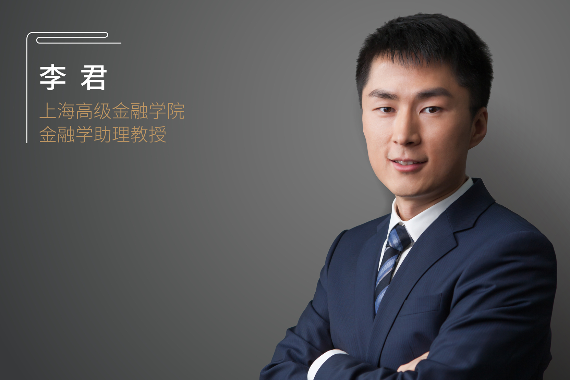
February 26, 2021
Challenges and the Future of FinTech - The First “Yangtze River Finance” Sum ...
Aiming to further drive the rapid growth of the new financial sector at Jiangbei New District of Nanjing, the first “Yangtze River Finance” Summit Forum was held at Jiangbei New District on December 23rd, 2020. Regulators, the academic community, industry guests, and financial institutions discussed a number of topics centered as FinTech. These included: industry innovations, macro effects, risk patterns, technological advancements, regulatory updates, and future trends. Attendees engaged in in-depth academic exchanges and experience sharing to facilitate the joint evolution of the financial sector. On the theme of “Challenges and Future of FinTech”, the Forum was hosted by Nanjing Jiangbei New District Management Committee and the Shanghai Advanced Institute of Finance (SAIF) at Shanghai Jiao Tong University (SJTU). It was jointly sponsored by the Nanjing Jiangbei New District Finance Bureau, the Nanjing Jiangbei New District Central Business District Construction and Management Office, and the Nanjing Institute of Digital Finance Industry Co., Ltd. At the Forum, the Nanjing Jiangbei New District Management Committee signed a strategic cooperation agreement with SAIF which was in addition to another cooperation agreement between SAIF and the Nanjing Jiangbei New District Central Business District Construction and Management Office. Subsequently, Professor Guangshao Tu and Mr. Jianrong Shen jointly unveiled the Nanjing Jiangbei New District Campus of the SAIF FinTech Innovation Base.
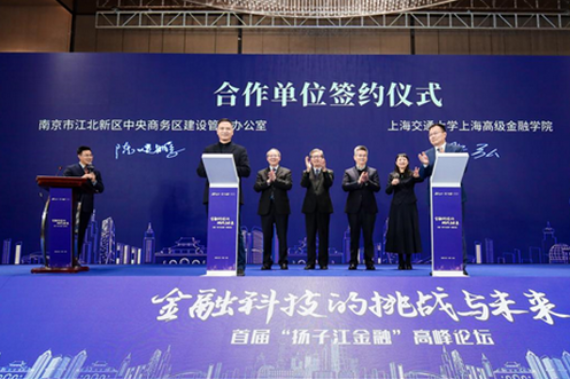
February 09, 2021
Integrating Industry with Finance under the New Landscape of Dual Circulation
On December 27th, 2020, the Financial Forum on “Integrating Industry with Finance under the New Landscape of Dual Circulation”, jointly hosted by the M&A and Restructuring Committee of Global Financial Leaders Forum and the Shanghai Chapter of the Alumni Association of the Shanghai Advanced Institute of Finance (SAIF), was successfully held in Shanghai. The event focused on a number of hotspot topics, including: “SMEs and Industrial Digitalization Empowered by Dual Circulation”, “Diversification Solutions for Listed Companies in Distress”, and “Integrating Industry with Finance in Capital Markets under the New Landscape of Dual Circulation”. Influential scholars and experts in related fields were invited to discuss and share their insights on new solutions and opportunities for the integration of industry and finance. More than 200 participants were present, including SAIF faculty and alumni, and industry experts such as: Professor Chun Chang, Executive Dean of SAIF and Chairman of Global Financial Leaders Forum; Professor Qigui Zhu, Secretary of the CPC Committee at SAIF; Professor Hong Yan, Deputy Dean for Faculty and Research at SAIF; Mr. Ning Zhang, Co-Chairman of Global Financial Leaders Forum and President of SAIF Alumni Association; and Mr. Jianjun Wang, Chairman of M&A and Restructuring Committee of Global Financial Leaders Forum and Executive President of the SAIF Alumni Association. The Forum was presided over by Mr. Li Kai, Co-Secretary-General of M&A and Restructuring Committee of Global Financial Leaders Forum, Director of Bankruptcy and Non-performing Assets Research Committee of Shanghai Lawyers Association, and Partner of Fangda Partners. Mr. Tong Cao, Chairman of Shenzhen Hande FinTech Holding Co., Ltd., delivered a keynote speech on the theme of “SMEs and Industrial Digitalization Empowered by Dual Circulation”. Guests shared their insights on the topic of “Diversification Solutions for Listed Companies in Distress” from the multifarious perspectives of law firms, investment bankers, clubs, funds, listed companies, asset managers, and industrial investors.
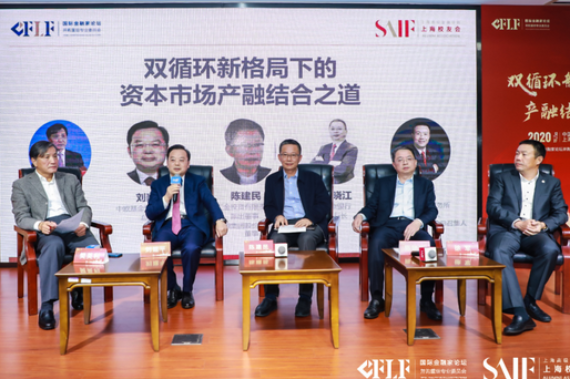
February 05, 2021
SAIF held 2020 Year-End Meeting & Award Ceremony
On January 29th, 2021, the Shanghai Advanced Institute of Finance (SAIF) held the 2020 Year-End Meeting & Award Ceremony. Professor Kuiling Ding, Member of the Standing Committee of the CPC Committee and Executive Vice President of Shanghai Jiao Tong University (SJTU); Professor Guangshao Tu, Adjunct Professor at SJTU and Executive Director of SAIF and Professor Jiang Wang, Executive Director and Chair of Academic Council at SAIF delivered speeches, followed by an annual report by Professor Chun Chang, Executive Dean and Huifu Chair Professor at SAIF. Nearly 200 faculty and staff members were in attendance. During his speech, Professor Kuiling Ding congratulated SAIF on its achievements in the “extraordinary year” of 2020, under the great impact of COVID-19 outbreak. He also pointed out that the next decade will be a critical period for SJTU to solidify its position at the forefront of leading universities and for SAIF to build itself into a world-class financial school. He hoped that SAIF faculty and staff would make a joint effort to kick off the upcoming new year and to develop SAIF into one of the SJTU’s best brands. Professor Guangshao Tu delivered a speech on the theme of “Farewell to the Old and Welcome to the New”, in which he summed up the past and looked forward to the future with three key words: “celebration”, “appreciation”, and “blessing”. Professor Chun Chang reviewed the overall development of SAIF in 2020, including organizational structure, faculty pooling, human resources development, academic research, policy think tank and partnerships. An award ceremony was followed on which several individuals and teams were rewarded for their outstanding performances during the past year.
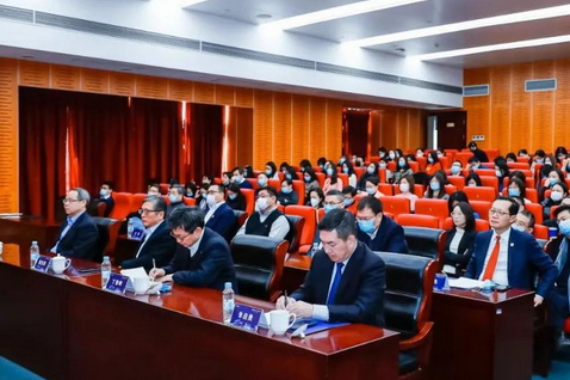
January 08, 2021
Shanghai Finance Forum 2020 and Press Conference on the "Evaluation and Pro ...
On December 13th, 2020, Shanghai Finance Forum 2020 and a press conference on the "Evaluation and Prospect of Shanghai as an International Financial Center" were successfully held in Shanghai. Both were jointly organized by Shanghai Advanced Institute of Finance (SAIF) at Shanghai Jiao Tong University and the National Institution for Finance and Development (NIFD). The events were co-sponsored by the China Financial Information Center, the Shanghai Finance Institute, and the Shanghai Putuo District People's Government (with the support of the Global Financial Leaders Forum). With the COVID-19 outbreak, global political and economic structures have been altered at an accelerated pace, and the traditional financial system is facing challenges. Innovations and changes are imminent. At a time when China is ushering in the end of the 13th Five-Year, Shanghai Finance Forum 2020 (with the theme of "Reform and Opening-up: Shanghai as an International Financial Center in the age of Dual Circulation Economy") facilitated dialogue at multiple levels and in multiple fields. Dozens of notable guests at home and abroad gathered to explore and forecast global financial and economic trends and contribute their expertise, including: Xiaochuan Zhou, President of China Society for Finance and former Governor of the People's Bank of China; Mervyn King, Alan Greenspan Professor of Economics at New York University and former Governor of the Bank of England; Raghuram Rajan, Distinguished Service Professor of Finance at the Booth School at the University of Chicago and former Governor of the Reserve Bank of India; Guangshao Tu, Adjunct Professor of Shanghai Jiao Tong University and Executive Director of SAIF; Yang Li, Chairman of the National Institution for Finance and Development, Chief Expert and Chairman of the Academic Committee of Shanghai Institution for Finance and Development and Adjunct Professor of SAIF; and Howard Marks, Founder and Co-Chairman of Oaktree Capital Group, etc. The international and domestic economy (and society itself) are being greatly affected by the COVID-19 pandemic.. To this end, focusing on the theme of "Global Economy and Finance under COVID-19", Xiaochuan Zhou, Mervyn King, and Raghuram Rajan (who visited Shanghai Finance Forum for the 2nd time), delivered opening speeches. Their presentations discussed trends and solutions for international economy and finance; these included: "IT Development Drives the Modernization of Smart Systems and Facilitation of Cross-border Payments", "Global Economic Recovery after COVID-19", and "Impact of Loose Monetary and Fiscal Policies on Today’s Global Economy". As a major component of this Forum, Prof Guangshao Tu and Professor Yang Li jointly released "Evaluation and Prospect of Shanghai as an International Financial Center", which was co-authored by SAIF, the National Institution of Finance and Development, and Shanghai Finance Institute. The report presents advice on the new development landscape for Shanghai as an international financial center. The report emphasizes that it is important to improve and optimize financial systems and structures in China. Second, it is essential to speed up the consolidation of Shanghai’s position among worldwide RMB asset centers and to drive RMB internationalization. Shanghai will play a greater role in supporting the effective allocation of domestic and international financial resources. In addition, the report also puts forward the long-term goal of Shanghai as an international financial center. That is, by 2035, Shanghai will become a global financial center based in the Asia Pacific region, centered as an open and modern financial market, marked as a global RMB asset allocation center, and comparable to London and New York.
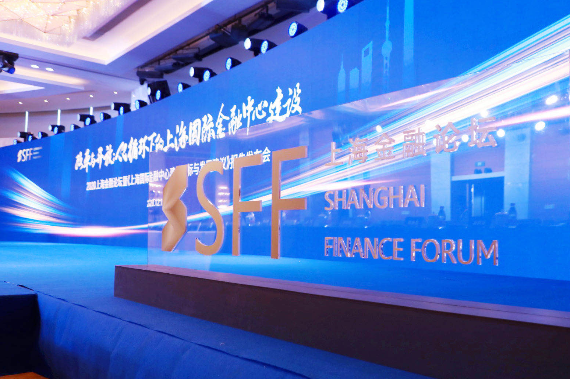
January 08, 2021
Professor Jiang Wang Awarded the 3rd Contemporary Economics Prize
The 20th China Economics Annual Conference and the Award Ceremony of Contemporary Economics Prize were held in Shenzhen on the evening of December 5th. Professor Jiang Wang (Chair of Academic Council at Shanghai Advanced Institute of Finance (SAIF) at Shanghai Jiao Tong University and Mizuho Financial Group Professor at Sloan School of Management, MIT) and Professor Wei Xiong (Professor of Finance at Princeton University) jointly won the 3rd Contemporary Economics Prize in 2018. Chun Chang (Executive Dean and Huifu Chair Professor of SAIF), Qiao Liu (Dean of the Guanghua School of Management, Peking University), and several Nobel laureates in Economics were invited to deliver congratulatory speeches. Established and selected by the National Economics Foundation, the Contemporary Economics Prize is designed to encourage theoretical innovation and drive economic science. By recognizing Chinese scholars who have made outstanding contributions in the field of economics, it motivates and promotes Chinese economists to contribute to the development of economic science. At this ceremony, in addition to Professor Jiang Wang and Professor Wei Xiong (who were jointly awarded the 3rd Contemporary Economics Prize in 2018), Professor Shangjin Wei (Tenured Professor at Columbia University) and Professor Yifu Lin (Boya Chair Professor and Dean of the Institute of New Structural Economics at Peking University) were also awarded the 4th Contemporary Economics Prize in 2019. When announcing the prizes, Professor Bin Xia (Chairman of the National Economics Foundation and Counselor of the State Council) pointed out that Professor Jiang Wang systematically introduced market friction into the new classical capital market theory to create a new theoretical framework for asset pricing and made outstanding contributions to the development of economic theory. The research findings include: constructing an equilibrium model that reflects the actual trading needs of market participants; providing a new framework for analyzing the characteristics of market equilibrium trading volume and asset prices; providing new explanations for important phenomena such as market bubble and collapse, the volume-price relationship between interest rate and the stock market, and the liquidity premium of assets; offering a new foundation of theoretical and empirical analysis for market liquidity and its systematic risks by systematically studying market liquidity from the perspective of market friction; and analyzing the possible loss of market effectiveness caused by various market frictions and defects and the corresponding regulatory and policy solutions. Due to COVID-19, Professor Jiang Wang, who lives in the United States, was unable to attend the award ceremony in person. When he delivered the award-winning speech via video conferencing, he expressed his pleasure at winning the prize and his sincere thanks to the National Economics Foundation, guests, and his mentors, research partners, colleagues, students, and family members. He said that one of the key reasons why the Foundation awarded the 2018 Prize to the financial sector was because of the importance of finance. Professor Jiang Wang expressed the need for more ambitious talent to join in this cause and expounded upon the importance of modern finance. Finance plays an essential role in the modern economy, which is not only the core platform to regulate economic resources, but also the main driving force for economic development. As a key component of economics, modern finance theory has not only led many revolutions in the financial sector, but also greatly enriched economics over the past 7 decades. Furthermore, China's economic development is now undergoing fundamental changes: from scale to quality and from investment-driven to innovation-driven, which relies on the support and promotion of a modern financial system. Later, many well-known economists congratulated Professor Wang. Professor Thomas Sargent, 2011 Nobel Laureate in Economics, stated that Professor Wang has made great achievements in promoting the cognitive expansion and pricing of financial markets. Professor Lars Peter Hansen, 2013 Nobel Laureate in Economics, mentioned that Professor Wang attaches great importance to empirical evidence and focuses on theoretical applications, opening up a new direction for financial market research. Professor Qiao Liu, Dean of Guanghua School of Management at Peking University, affirmed the significance of Professor Wang’s research to the reform and development of China's financial markets. In his congratulatory speech, Professor Chun Chang (Executive Dean and Huifu Chair Professor of SAIF), not only recognized Professor Wang’s pioneering and practical academic research, but also especially praised Professor Wang for his great contributions to China's modern economic and financial education. As for the development of economic and financial disciplines in China, Professor Chang pointed out that today’s rapid development of information and digital technologies has wrought great challenges upon economic and financial research. Under new patterns of social exchange and cooperation, economists and financial researchers must reconsider the traditional theoretical definition of these boundaries between the state, public and private sectors, and markets and enterprises. These studies call for a problem-driven mindset and global vision. Only in this way can we truly drive the development of economic and financial science. Finally, he hoped and believed that — with continuous development, openness, and strength — the Chinese research community will become part of mainstream global research and will make further and greater contributions to the global economy and to finance itself.
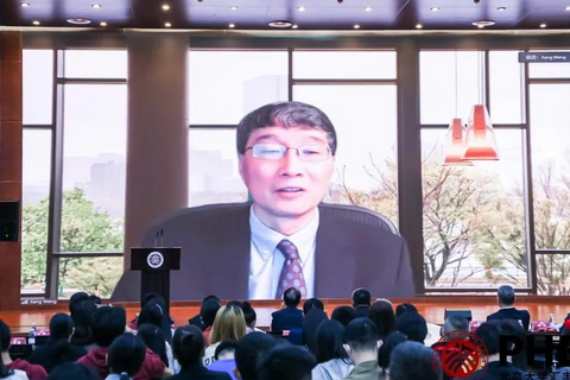
January 07, 2021
The 6th Annual Five Star Workshop in Finance Held at SAIF
The 6th Five Star Workshop in Finance (FSWF) was held on November 28th, 2020 at Shanghai Advanced Institute of Finance (SAIF) at Shanghai Jiao Tong University. More than 50 senior professors and young scholars from major financial education and research institutions in China shared and discussed the latest research findings, both offline and online. FSWF facilitates academic exchanges in China’s financial sector and improves the research quality of young financial scholars by discussing the latest research trends and thesis proposals of financial disciplines in these institutions. The workshop was initiated by SAIF in conjunction with: the PBC School of Finance at Tsinghua University, the Guanghua School of Management at Peking University, the Hanqing Advanced Institute of Economics and Finance at Renmin University of China, and the Cheung Kong Graduate School of Business. Later, more schools joined, expanding membership to nine. These include: the Tsinghua University School of Economics and Management, Peking University HSBC Business School, The Chinese University of Hong Kong at Shenzhen, and Fanhai International School of Finance at Fudan University. The 6th FSWF was hosted by SAIF. Professor Hong Yan (Professor of Finance and Deputy Dean Deputy Dean for Faculty and Research at SAIF), attended and delivered a speech. He highlighted the fact that FSWF is a special platform for young financial scholars to exchange ideas, learn from each other, and discuss the latest research findings. He hoped that the participating scholars would make full use of this platform and carefully absorb comments and suggestions from peers and senior professors. Fourteen academic papers were shared at the event, which focused on six topics, including: China's banking industry, empirical corporate finance, institutional investors, bond investment, social factors and financial markets, and theoretical and empirical research for asset pricing. Fourteen authors presented on the progress of their papers, while senior scholars discussed and commented on the topics and the contents. Other participants also joined in the exchanges. Yongxiang Wang (Professor of Finance at SAIF) and Bing Han (Distinguished Professor at SAIF) attended the event and commented on papers. A number of assistant professors organized and attended the workshop, including: Yurong Hong, Qiushi Huang, Jie Li, Jun Li, Xiaomeng Lu, Yiyao Wang, and Chao Zi.
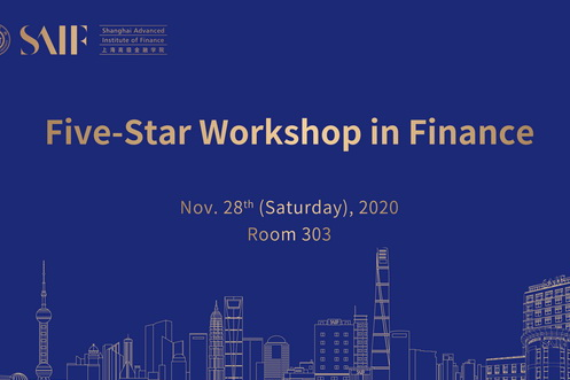
January 07, 2021
Successful Career Transformation: Salaries of SAIF FMBA 2020 Graduates Hits High ...
Shanghai Advanced Institute of Finance (SAIF) at Shanghai Jiao Tong University recently released the Full-time Financial MBA (FMBA) Employment Report, which shows that 93% of SAIF FMBA graduates had achieved their career transformation/promotion in the financial sector. The median salary has increased by nearly 90% as compared with salaries before enrollment. As China's first financial MBA program, over the years, SAIF FMBA Program has been highly recognized by industry for its world-leading financial education system and outstanding teaching. Graduates have continued to gain great favor from financial institutions. This year, 42 FMBA graduates had an average starting salary of RMB 288,000, up 72% over figures before enrollment, with the median being RMB 280,000 (an increase of 87% over figures before matriculation). Aimed at fostering industry leaders with modern financial expertise, SAIF FMBA Program is committed to training a community of financial talent with local influence and international competitiveness. Entrepreneurs and professional managers with an industry background, a financial mindset, and an innovative spirit are also welcomed to join. Statistics shows that in this intake, 45.24% of the FMBA graduates came from the financial sector and 54.76% came from non-financial industries before joining SAIF. After two years of systematic education and training through the SAIF FMBA Program, the students have been enriched and strengthened in terms of professionalism, skills, and global outlook. Upon graduation, 93% of them have successfully realized career transformation or job promotion in the financial sector, or have been hired by industry-leading employers. Asset managers employ 50% of our graduates, of which 32.5% are engaged in primary markets such as asset management-private equity/venture capital. Employers include a number of well-known institutions in the industry, including: Hillhouse Capital, Panda Capital, Bank of Communications International, and Shanghai Science Venture Capital (Group) Co., Ltd. Investment banks, securities companies, and financial advisors employed 42.5% of our graduates. Most of the employers are reputable investment banks and leading securities firms, including: China International Finance Corporation Limited, CITIC Securities, Guotai Junan Securities, and Shenyin Wanguo Securities. In addition, the "Finance +" multidisciplinary quality of FMBA graduates has been gradually recognized and favored by the market. Some graduates have even entered into a “fast track” to professional promotion by participation in management trainee programs with such companies as the China Resources Group and Thermo Fisher Scientific - SA. Investment and research positions are most popular among for this year's SAIF FMBA graduates, accounting for 60% of the total. In addition, sales/trading and investment banking represent 22.5% and 10%, respectively. Of the investment and research posts, 37.5% are engaged in primary market investment and research, while 22.5% are engaged in secondary market investment and research. Of the sales/trading posts, 15% are engaged in sales and 7.5% are engaged in trading.


211 West Huaihai Road
Shanghai 200030, China
Tel: +86 21 6293 3500
9th Floor, Building T6, Hongqiao Hui
990 Shenchang Road
Shanghai 201106, China
3rd Floor, Building D, Chenfeng Building
800 Tongpu Road
Shanghai 200062, China
5th Floor, West Tower, World Financial Centre
1 Dong San Huan Middle Road
Chaoyang District, Beijing 100020, China
Tel: +86 10 5081 5880
1203 Tower 7, One Shenzhen Bay
Nanshan District, Shenzhen 518000, China
Tel: +86 755 8663 8815
© Shanghai Advanced Institute of Finance All Rights Reserved.


Top